WriteOn
Country Profile: Ireland
| Population | 4.37 million |
|---|---|
| Official Languages | English and Irish |
| Total Expenditure on Education as % of GNP | 4.7% (2005) |
| Access to Primary Education – Total Net Intake Rate (NIR) | Men: 98.8% |
| Adult Literacy Rate (15-24 years) | PIAAC test results: percentage of adults scoring at each proficiency level in literacy (level 1 represents the lowest level of proficiency, level 5 the highest): Below level 1: 4.3% Source: PIAAC 2012 |
| Sources |
Programme Overview
| Programme Title | WriteOn |
|---|---|
| Implementing Organization | National Adult Literacy Agency (NALA) |
| Annual Programme Costs | With an average 600 learners per year, and approximately 2,000 hours of telephone tutoring, WriteOn costs in the region of €100,000 ($138,000 USD) per year including all staff and tutoring costs, plus just over €11,000 ($15,000 USD) for the hosting and maintenance of the web service. |
| Date of Inception | September 2008 |
Background and Context
1997 was a damning year of reckoning for adult literacy in Ireland. The OECD’s International Adult Literacy Survey found that one on four adults did not have the literacy skills necessary to effectively take part in Irish society, whilst Ireland’s International Adult Literacy Survey (IALS) also found that 25 per cent of adults have problems with basic Level 1 literacy tasks, and 18.5 per cent of the labour force had not achieved Level 2 qualifications, equivalent to basic primary school leaver’s qualifications. Despite excellent rates of primary school enrolment, the IALS report found that these deficiencies in adult literacy came from a combination of poor primary education - one in ten children leaving primary school with literacy difficulties, and three in ten in disadvantaged areas – and minimal support for adult literacy development, which was allocated just 0.3 per cent of thetotaleducation budget.
Public funding for adult learning in Ireland has since risen from €1m ($1.4m USD) in 1997 to €30m ($41m USD) in 2012, and the number of available adult literacy learning places has increased from 5,000 to 57,000. Whilst this represents a significant improvement, the National Adult Literacy Agency (NALA) says that support is still only provided to 11 per cent of the people in need. The recently released results of the OECD Survey of adult skills (PIAAC) indicates that 4.3% of the Irish adults are still at a below level 1 proficiency in literacy and 13.2% are only at level 1 (OECD, 2013). It is not easy to reach out to adults affected by low literacy skills. This is partly because people often feel too embarrassed to return to learning and go to great extremes to hide their difficulties from their friends and family. Similarly, some people have had a negative experience of school in the past and associate returning to learning with that experience.
Founded in 1980, NALA’s mission is to meet the needs of the remaining 89 per cent who continue to lack access to adult literacy learning, through distance learning, and especially through its primary distance learning initiative, WriteOn.
WriteOn programme
WriteOn (http://www.writeon.ie) was launched by NALA in September 2008 to provide free online learning across the country, to facilitate literacy development and accreditation for adult learners at Levels 2 and 3 of the National Framework of Qualifications of Ireland. The website was developed by Avallain, a Swiss company who had previously built the similar German website, ich-will-lernen.de (see Ich Will Lernen in the UNESCO LitBase). NALA procured a team of authors to produce the content for the site which took approximately 5 months to develop.
The programme follows the lessons learnt from NALA’s previous distance learning services, namely literacytools.ie (2004) and rug.ie (2007), and now provides online learning for 32,000 users across the country.
WriteOn provides two primary services to enable learners to achieve Levels 2 and 3 accreditation. Firstly, a Recognition of Prior Learning (RPL) tool that uses online assessments allows learners to obtain qualifications for what they have previously learnt but never received formal accreditation for; this innovative facility is the only method of RPL available in Ireland. Secondly, for those who do not qualify for certification through RPL, WriteOn offers a comprehensive suite of online learning materials, complemented by one-on-one tutor availability, for users to improve their skills and work towards accredited qualifications.
Although the programme is specifically designed for individuals working through online learning materials in their own time, the WriteOn programme also lends itself to blended learning approaches in physical ‘bricks-and-mortar’ learning institutes, and is currently being used by 180 learning centres across the country.
Currently, learners may work towards the award certificates listed below in Table 1. As the table shows, the programme includes a wide range of everyday subjects that cover literacy, functional skills and life skills.
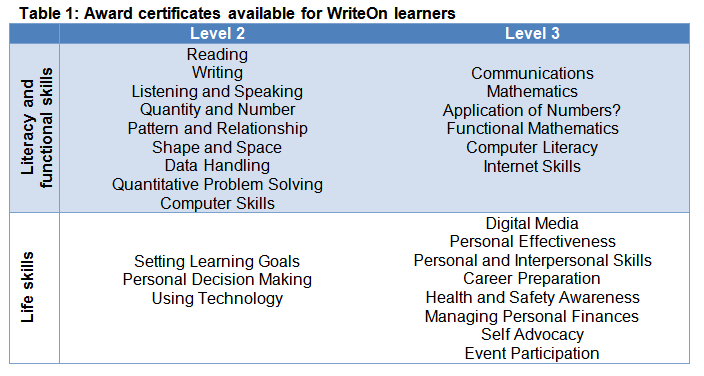
Aims and Objectives
WriteOn aims to provide high quality and free distance learning to improve literacy for all, through mitigation of the following barriers:
- WriteOn aims to mitigate potential stigma associated with a lack of basic adult education by providing a private and confidential learning environment.
- The programme aims to mitigate the burden on those without childcare facilities or without means of transport, by providing a facility for learning at home and at any time.
- The free service aims to encourage participation from lower income groups who may otherwise be excluded from similar adult qualification programmes.
WriteOn intends to meet the needs of the 89 per cent ‘gap’ by increasing participation in its programme, through increased user numbers, more locations, more learner profiles, and more qualifications.
Programme Implementation: Approaches and Methodologies
Organisational Struture
WriteOn is a programme of the NALA Distance Learning Service and benefits from access to NALA’s experience and expertise. Specifically, the operation of the WriteOn programme depends on the following team members:
- Distance Learning Co-ordinator, who oversees WriteOn as part of NALA's Distance Learning Service
- Distance Learning Administration team (1 full time and 2 part time staff) who handle queries from centres and learners and manage quality assurance procedures and documentation
- Internal Verifier (only works on content as each round of accreditation approaches, typically 5 days per round)
- Online Assessors, who also function as Distance Learning Tutors for the wider Distance Learning Service.
Recruitment and Training of Facilitators
To complement the online learning materials, learners have access to one-on-one tutor sessions via telephone. Learners may call a Freephone number and arrange for a tutor to call them back at a time of their convenience, free of charge. The WriteOn tutors are qualified and experienced adult literacy instructors. These tutors are hired on a part time basis and paid an equivalent wage of €40 ($55 USD) per hour of learner contact time. The number of tutors recruited is flexible and dependant on demand; the actual number of employed tutors has fluctuated between 11 and 29 in recent years.
Training is provided to tutors in regards to the specific requirements of the WriteOn programme, but no formal training in literacy instruction is given. Rather NALA hires ready qualified professionals.
Mobilisation of Participants
Since the inception of WriteOn in 2008, NALA has broadcast 13 educational television series during prime-time viewing hours, with a total of 61 hours of television content. This has proved to be an effective means of mobilising an audience, who are then invited to interact with the WriteOn programme through the internet, Freephone or Freetext. NALA operates a year round Freephone support line and receives approximately 10,000 calls per annum from adults enquiring about how they can improve their literacy skills.
Users are then forwarded to create an online learner account, and then proceed to the Skills Checker service which determines the learner profile and presents the learner with a range of options for the awards that they may work towards. The Skills Checker (see Figure 1) asks 35 questions which cover all of the 26 awards available on WriteOn. Learners are asked reflective questions, to which they answer Yes or No. This then presents a visual graph of a learner's 'spiky profile' (see Figure 2) with recommendations for study. Learners can return to the Skills Checker at any time and change their answers if they feel their skills have changed. In this way, learners can see a visual picture of skills and competence improvement.

Figure 1: Skills checker

Figure 2: Learner's 'spiky profile' with learning recommendations
Training-Learning Methods and Approaches
The primary concept of WriteOn is that learners work independently online at home, at times and in conditions that suit them, with the optional support of tutors available on Freephone.
Learning content is based on the specific learning outcomes which are set out in the 26 national awards which learners are able to work towards. As shown in Figure 3, the learners online lesson plan shows a roadmap of learning outcomes that contribute to the final reward, The user may click on any learning area to proceed with assessment questions and move along the ladder towards level completion.
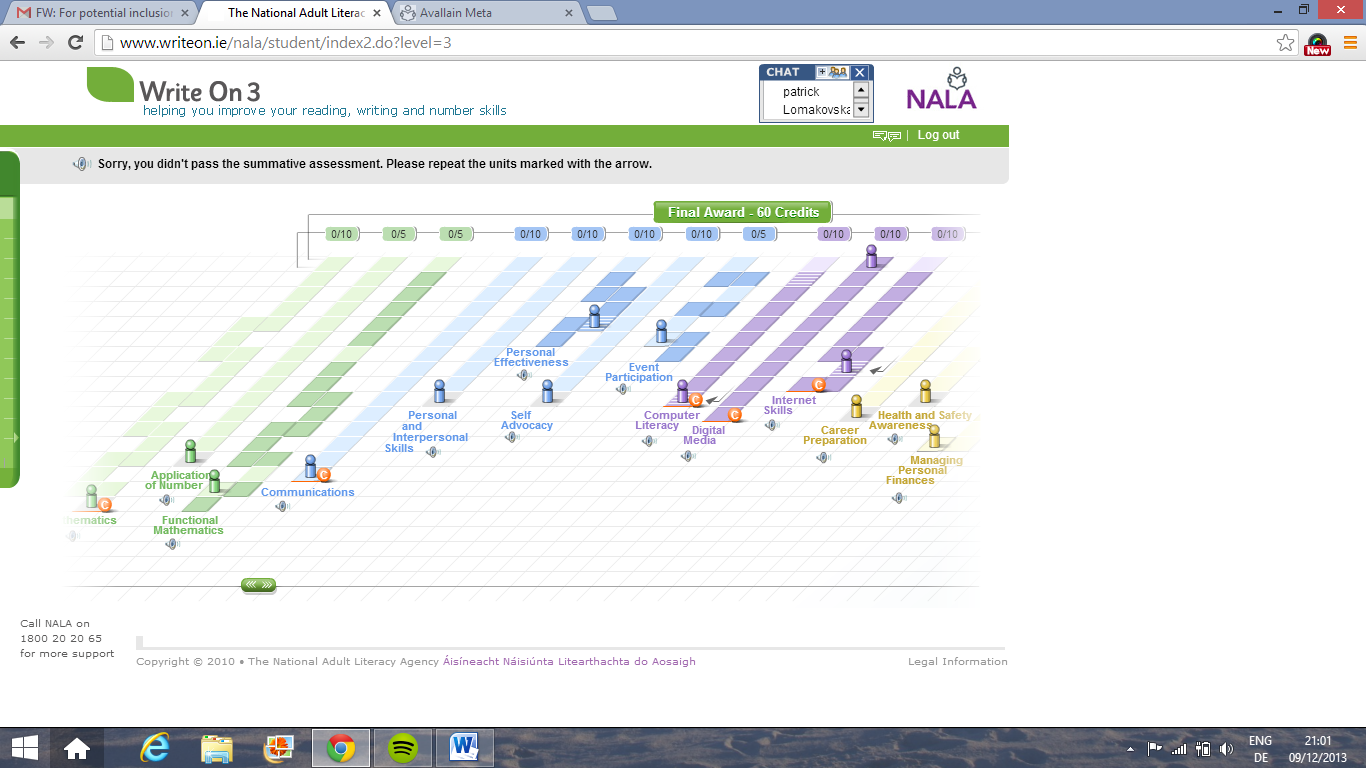
Figure 3: Learner's online lesson map for awards
The courses are delivered in the form of online exercises and 16 online work books that take learners through real-world examples to apply the skills being learnt. The primary themes through which the content is taught are family, health, sport & leisure, work, money and technology.
For example, in the double page workbook screenshot shown in Figure 4, learners are introduced to the mind mapping learning technique through practical examples, including the household and factors to consider when buying a car. This double page includes a mixture of learning methods including graphical explanation and exercises, whilst video demonstrations for various elements are also available in the resource centre online. Figure 4 shows how the workbook appears in an interactive online environment, where the user has the option to interact with the material in a number of ways and search for specific topics or learning outcomes. The programme is in this way entirely flexible; learners are not required to follow a set programme but instead may pursue subjects and themes of their interest and needs in order to work towards the skills that they want to develop.
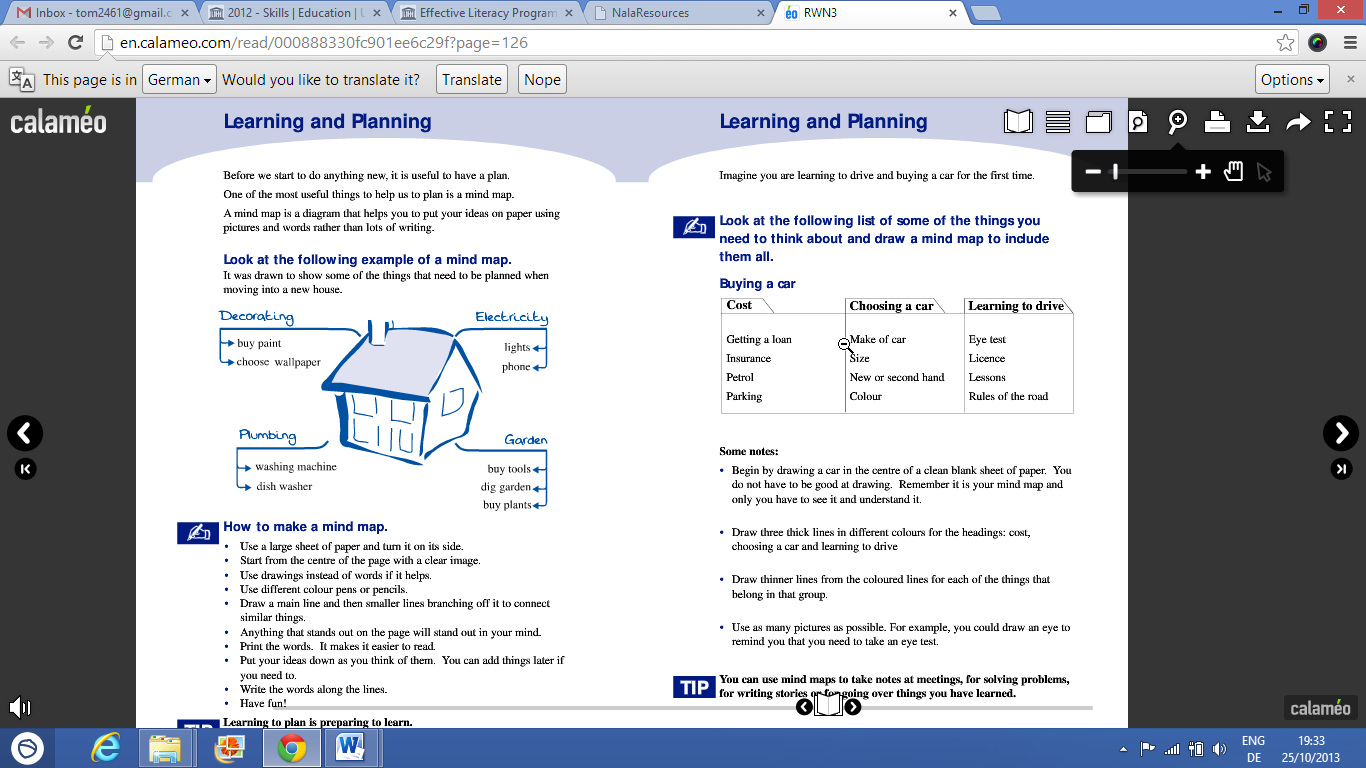
Figure 4: Screenshot of a double page from an online workbook
Figure 5 shows a double page example from one of the online work books that includes written exercises; the user may either type into the online workbook or print the pages to work on them by hand.
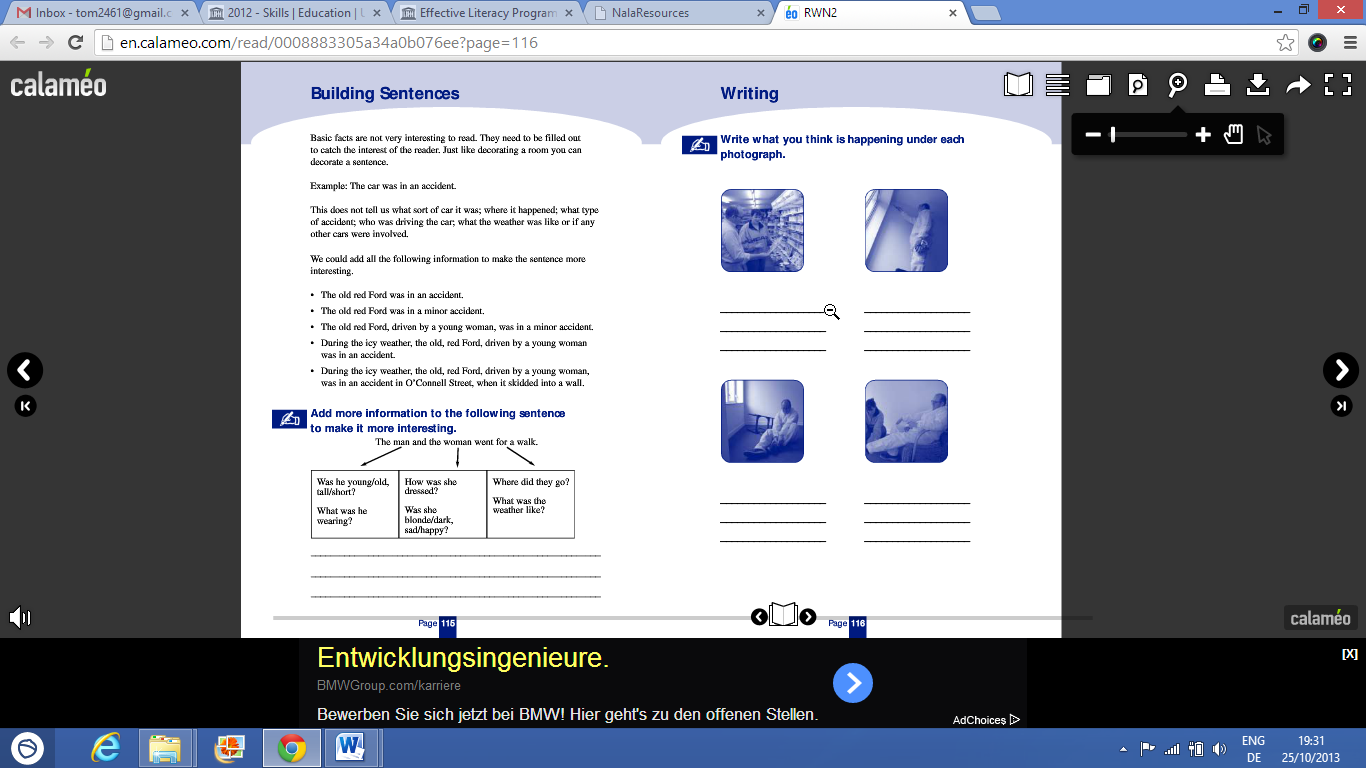
Figure 5: A learning exercise from the online workbook
In addition to use by independent learners, 180 learning centres, including schools and adult learning institutions in Ireland are using WriteOn in a blended working environment, typically by assigning learners taught in classroom environments with tasks to complete at home in order to solidify their understanding. In this respect WriteOn has not only provided a service for independent learners but has also improved the tools available to those who have managed to access traditional or more formal forms of learning.
Teaching outcomes:
WriteOn learners have the option to obtain or work towards accredited level 2 and 3 qualifications through the national governing body Quality and Qualifications Ireland (QQI). Figure 6 shows the steps to award achievement. As the graphic shows, the RPL tool allows the learner to move straight from stage 3 to stage 5 in order to achieve certification for skills that they already possess.
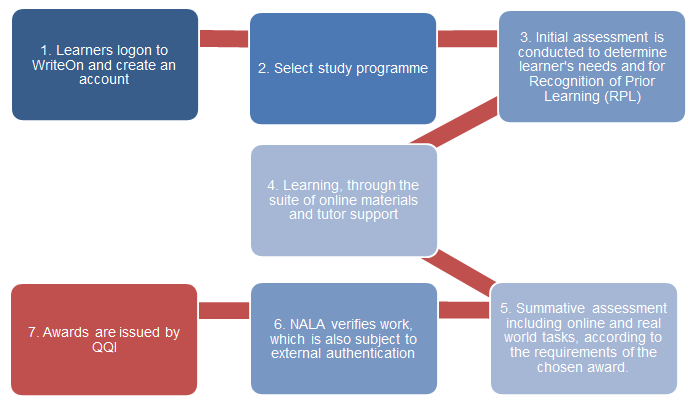
Figure 6: Steps to award certification through WriteOn
Programme Impact and Challenges
Monitoring and Evaluation
In order to verify that the programme meets NALA’s Quality Assurance Assessment Policy and Procedures, the WriteOn programme is annually subjected to three rounds of internal and external review.This ensures that the range of assessment techniques and instruments are as per the QQI requirements for each programme.
In addition, annual monitoring visits are conducted by QQI, and independent evaluations of the programme and the overall Distance Learning Service are commissioned on a regular basis, in order to measure the programme impact and improve the service provided. Learners are actively involved in external evaluations through surveys and interviews.
Impacts
Since its inception, over 32,000 learners have created accounts with WriteOn, with over 2,500 learners going on to obtain 14,500 national certificates at levels 2 and 3 .
Furthermore, more than 180 learning centres around the country, as well as 31 out of 33 national vocational education committees use the WriteOn programme for blended teaching methods and accreditation. WriteOn has therefore reached nationwide recognition and has been adopted my many users as a stand-alone educational tool or to compliment other existing programmes and courses.
Innovative features
The WriteOn programme is innovative in its highly personalised approach that allows learners to study what they need and want to, at any time to suit their lifestyles. This personal approach combines an individual responsibility for self-development with personal tutor support and relevant learning materials, which are delivered through a range of day-to-day mediums, including television, telephone, internet and paper-based learning materials.
WriteOn also claims to be the only online programme of its kind in the world to offer learners a means of certification through Recognition of Prior Learning, and reports that several other countries, including Turkey and New Zealand, have contacted WriteOn with a wish to replicate the service, although no such services have yet been launched.
Challenges
WriteOn’s popularity has led to its widespread use across organisations for which its programmes and features were not originally designed. The initial implementation was designed largely for individual learners and did not anticipate the volume of demand in blended learning contexts. Moreover, the programme is beginning to attract a broader group of users, and is now not only used by literacy groups but also by disability organisations, probation services, and job clubs. This has meant that NALA has had to provide more tutors and training in tuition and accreditation than it anticipated. However, with help from its regular external assessments, the programme has responded and adapted to these needs and increased demands.
Sustainability
The automated programme administration, especially with regards to accreditation through Recognition of Prior Learning, minimises the need for human administrative support and helps to keep the programme sustainable in spite of the unanticipated demand. Furthermore, the programme is designed in a way so that the learning processes and materials are easily adapted or added to should the demand arise, as is clear in the programmes adaptation to more easily integrate blended learning in formal education centres.
The programme has a sustainable source of funding from the Government Department of Education and Skills.
Lessons Learnt
Through experiences with blended learning methods, combining WriteOn with traditional learning techniques, the NALA evaluation (2011) reports that:
- centres found that basic literacy learners were very interested in using ICT to improve their literacy skills;
- learners ICT skills were able to improve significantly in tandem with improvements in literacy skills;
- the use of the online programme to accompany traditional methods provided an effective means of extending learning time and encouraging independent study;
- the approach with WriteOn allowed tutors using blended methods to more effectively address individual learning needs.
The 2011 Connected! evaluation of the WriteOn programme finds that:
- WriteOn provides an attractive route back to learning for previously reluctant learners;
- WriteOn reduces the stigmatised image that is attached to the early stages of literacy learning;
- use of computers for the WriteOn programme provided a sense of accomplishment for many leaners that deviates from the negative associations of pen-and-paper with -previous educational experiences;
- the integration of literacy skills with computer use and real world examples provides learners with experience and skills that can be used in practical applications and may improve their employability;
- learners have become more autonomous and taken increased responsibility for their own learning, which has shown to yield improved learning outcomes;
- the service could be improved by adding a section for tutor training and instruction materials that could also be used by families or self-tutored small groups.
Sources
- http://www.nala.ie/resources/international-adult-literacy-survey-results-ireland
- http://www.nala.ie/resources/blended-learning-report-2011
- http://www.nala.ie/resources/nala-dls-evaluation-connected-improving-literacy-and-computer-skills-through-online
- http://www.nala.ie/resources/nala-distance-learning-service-evaluation-2012
- http://www.nala.ie/resources/wwwwriteonie-usability-testing-report-nala
- OECD (2013) OECD Skills Outlook 2013. First results from the survey of adult skills, OECD Publishing, http://dx.doi.org/10.1787/9789264204256-en
Contact
Tom O’ Mara
Distance Learning Co-ordinator
NALA, Sandford Lodge, Sandford Close, Ranelagh, Dublin 6, Ireland
+353 (0) 1 4127900
User: distance
Host: (at) nala.ie
http://www.writeon.ie

